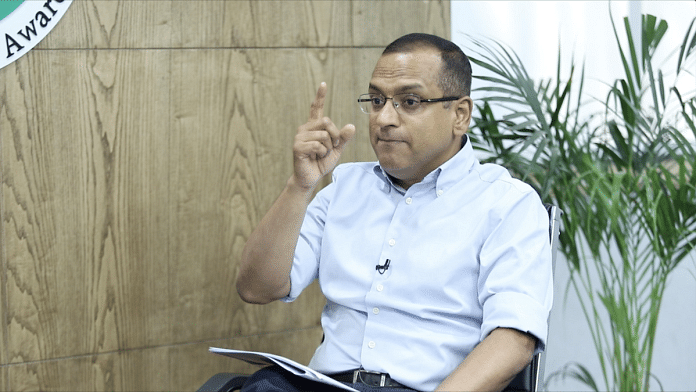New Delhi: The Indian economy has shown robust growth in the past one year, but it is not immune to the external pressures that affect a country’s growth, India Foundation founder Shaurya Doval said.
“While factors like global rise in oil prices and the Israel-Hamas war will affect the economy in the short term, it will not derail India from its long-term growth trajectory,” Doval told ThePrint on the latest episode of ‘Off The Cuff’ interaction on Wednesday.
Doval further spoke about the progress of the country’s economy and lauded new policy implementations that can pave the way for India to become a 30-trillion dollar economy
by 2047.
In the recent Monetary Policy meeting, the Reserve Bank of India (RBI) gave a positive growth outlook for India at 6.5 percent for the 2023-24 fiscal.
While the performance in various sectors look positive, analysts have time and again raised questions on the eradication of poverty from India and the low per capita income despite high growth rates.
“Only sustained growth can pull India out of poverty. We have a per capita income of $1,500 now, but by 2047, we aim to make it $15,000, which will be above the OECD (Organisation for Economic Cooperation and Development) level of development,” Doval said.
He added that making India a 30-trillion dollar economy by 2047 will aid largely in pulling people out of poverty.
Doval lauded policy makers and the Modi government for transforming the country into the current 3.5-trillion dollar economy, saying growth had doubled up after 2007.
Private sector in India
Elaborating on the higher contribution of the private sector to India’s GDP growth, Doval pointed out that the private sector is still sceptical about investing more in public sectors.
“The underlying corruption in India raises the risk of loss of capital. Once this decreases, we’ll start seeing private sector investment rise as a percentage of the GDP,” he said.
According to Doval, another step towards increasing the GDP growth of the country and making the best use of its labour force was through the Jan Dhan Yojana, which brought 500 million people from the informal sector to the formal sector.
He added that in order to encourage a higher participation from the private sector, the country needs to develop a more conducive environment for the private players to rely on.
Manufacturing sector
The manufacturing sector in India underperformed so far this financial year, whereas the services sector yielded good results. But, Doval focussed that this figure should not let one believe that there is no future for the manufacturing sector.
“India can’t grow alone with just services as the services sector cannot hold the labour force we are releasing into the market. Past governments in this country made a colossal failure and a great disservice to this country by allowing the manufacturing to fall from 25 percent of GDP to about 15 percent. The current government is trying to work and bridge that gap,” Doval said.
India needs to revamp its approach towards manufacturing and focus on areas like space, technology, etc that have immense growth potential, he added.
Economic growth an issue in 2024 polls?
When asked about what impact does the current economic development have on the voting patterns of Indians, Doval admitted that it does not affect the voters as much as it should.
“While the economy affects any voter directly, it does not have a direct influence on his vote. Issues like caste, religion and other social factors distort connectivity between economic benefit and political voting,” he said
But the younger generation of voters, he said, looks into aspects of economic development while voting. He pointed out that a large section of the population is more concerned about what they get free or at subsidised rates.
Political parties are also taking this route to garner more votes, he said.
Instead of giving freebies, governments should concentrate more on targeted assistance and creating healthy economic competition amongst states to encourage development, the India Foundation founder said.
Also Read: ‘Banks are money creators, they aren’t just passing the parcel,’ says former CEA Subramanian




